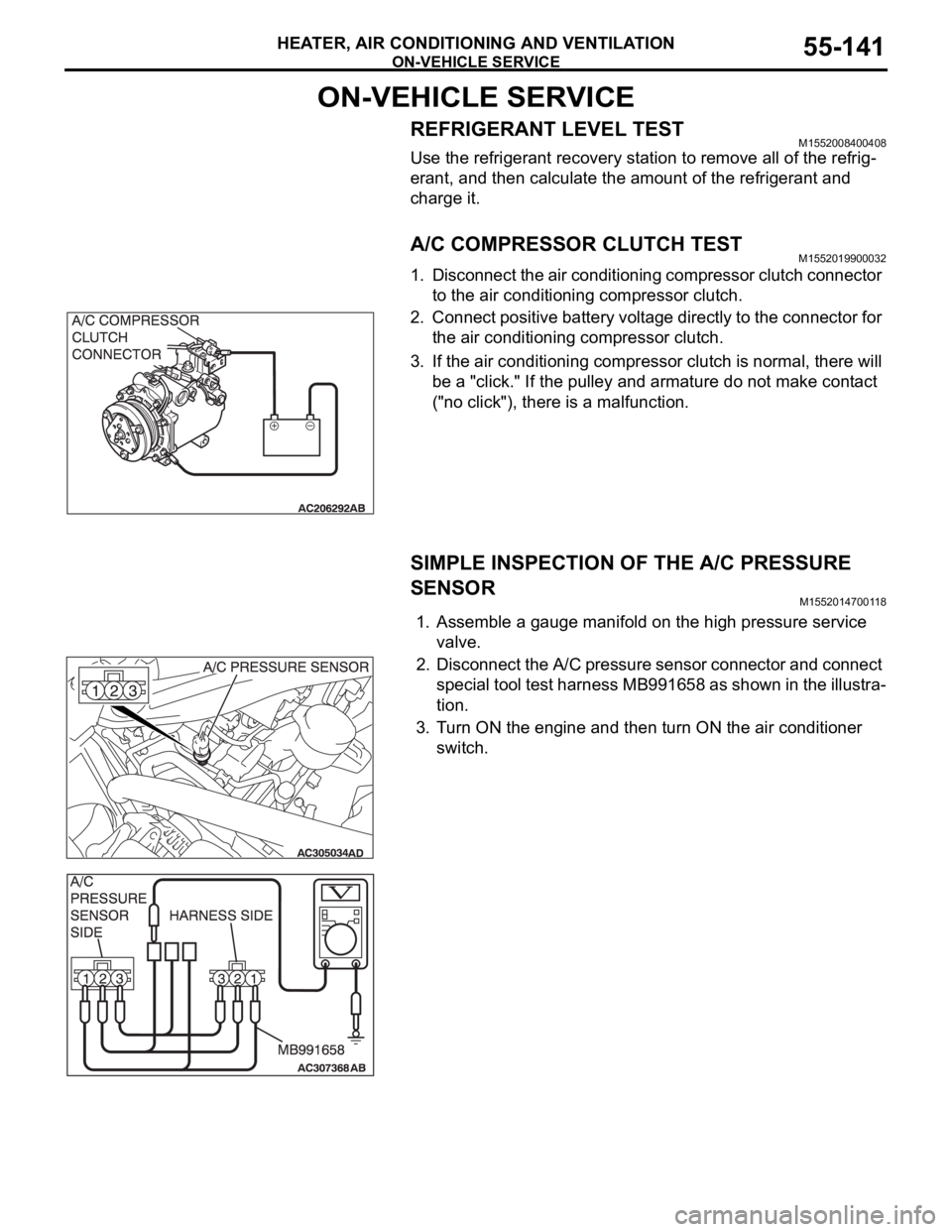Page 837 of 1500

AUTO A/C DIAGNOSIS
HEATER, AIR CONDITIONING AND VENTILATION55-136
ACTUATOR TEST REFERENCEM1554005200133
MUT-III DIAGNOSTIC
TOOL DISPLAYITEM NO. INSPECTION ITEM DRIVE CONTENT
Blower fan: OFF 83 Blower motor OFF
Blower fan: Middle 84 Middle speed
Blower fan: High 85 High speed
Air mix damper motor:
0%42 Air mixing damper control motor Opening degree: approx.
0% (Max cool)
Air mix damper motor:
100%43 Opening degree: approx.
100% (Max hot)
Air outlet c/o damper:
FA C E70 Mode selection damper control
motorFA C E
Air outlet c/o damper: Bi_
Level67 FOOT/FACE
Air outlet c/o damper:
FOOT71 FOOT
Air outlet c/o damper:
DEF/FOOT69 DEF/FOOT
Air outlet c/o damper:
DEF68 DEF
Idle up request: high load 74 Idle speed HIGH idle up
Idle up request: low load 75 LOW idle up
Idle up request: OFF 76 OFF
Rear defogger switch:
OFF40 Rear window defogger switch Rear window defogger: OFF
Rear defogger switch:
ON41 Rear window defogger: ON
Idle up request: OFF 50 Idle up operation Idle up: OFF
Idle up request: low load 51 Idle up: low load
Idle up request: high load 52 Idle up: high load
Condenser: 0% 77 Condenser fan OFF
Condenser: 50% 79 Middle speed
Rheostat: 0% 80 Rheostat- Illumination control OFF
Rheostat: 100% 81 Full duty
Rheostat: 50% 82 Half duty
Page 838 of 1500

AUTO A/C DIAGNOSIS
HEATER, AIR CONDITIONING AND VENTILATION55-137
CHECK AT A/C-ECU TERMINALM1552010300572
TERMINAL
NO.CHECK ITEM CHECKING REQUIREMENTS NORMAL CONDITION
1 Air mixing damper control motor When the air mix damper is
moved to the MAX. COOL
position. 10 V
When the air mix damper is
moved to the MAX. HOT
position. 0.5 V
2 Air mixing damper control motor When the air mix damper is
moved to the MAX. COOL
position. 0.5 V
When the air mix damper is
moved to the MAX. HOT
position. 10 V
3 Back-up power supply Always Battery positive voltage
4 Mode selection damper control
motor (DEF)When the damper is moved to
the FACE position. 0.5 V
When the damper is moved to
the DEF position. 10 V
5 Outside/inside air selection
damper control motor (outside)When the damper is moved to
the inside air recirculation
position.0.5 V
When the damper is moved to
the outside air induction
position.0 V (when the motor is
stopped)
6 Outside/inside air selection
damper control motor (inside)When the damper is moved to
the inside air recirculation
position.0 V (when the motor is
stopped)
When the damper is moved to
the outside air induction
position.0.5 V
8 Rear defogger relay Ignition switch: ON Battery positive voltage
9 Front blower relay Ignition switch: ON Battery positive voltage
10 A/C compressor relay A/C compressor relay: ON Battery positive voltage
11 Mode selection damper control
motor (FACE)When the damper is moved to
the FACE position. 10 V
When the damper is moved to
the DEF position. 0.5 V
12 A/C pressure sensor Ignition switch: ON 5 V
Page 839 of 1500

AUTO A/C DIAGNOSIS
HEATER, AIR CONDITIONING AND VENTILATION55-138
16 Potentiometer power supply Ignition switch: ON 5 V
17 Power transistor (BASE) When the blower speed
selection dial shows Maximum
air volume.1 V
18 Power transistor
(COLLECTOR)When the blower speed
selection dial shows Maximum
air volume.12.1 V
19 Photo sensor Ignition switch: ON 5 V
20 Sensors and potentiometers
groundAlways 0 V
21 Mode selection damper control
motor potentiometer inputWhen the damper is moved to
the FACE position. 4 V
22 Interior temperature sensor Ignition switch: ON 5 V
23 Ambient temperature sensor
inputWhen sensor temperature is
25
C (77F) [4 k]1.9 V
24 Air thermo sensor input When sensor temperature is
25
C (77F) [1.5 k]2.2 V
25 Photo sensor ground Ignition switch: ON 0 V
26 A/C pressure sensor at 2.6 MPa 3.9 V
27 Ground Always 0 V
28 Power supply to the ignition
switch (IG2)Ignition switch: ON Battery positive voltage
29 Air mixing damper control motor
potentiometer inputWhen the damper door is
moved to the MAX. HOT
position.1.4 V
30 Illumination ground Always 0 V
31 ILL power supply Lighting switch: ON Battery positive voltage
34 A/C pressure sensor ground Always 0 V
36 Power supply to the ignition
switch (ACC)Ignition switch: ON Battery positive voltage TERMINAL
NO.CHECK ITEM CHECKING REQUIREMENTS NORMAL CONDITION
Page 840 of 1500
SPECIAL TOOLS
HEATER, AIR CONDITIONING AND VENTILATION55-139
SPECIAL TOOLSM1552000600334
TOOL TOOL NUMBER
AND NAMESUPERSESSION APPLICATION
MB991367
Special spannerMB991367-01 Armature mounting nut of
compressor removal and
installation
MB991386 Pin MIT217213 Armature mounting nut of
compressor removal and
installation
MB991658
Test harness setTool not available Inspection of throttle position
sensor
Page 841 of 1500
SPECIAL TOOLS
HEATER, AIR CONDITIONING AND VENTILATION55-140
A: MB991824
B: MB991827
C: MB991910
D: MB991911
E: MB991914
F: MB991825
G: MB991826
MUT-III Sub
Assembly
A: Vehicle
communicatio
n interface
(V.C.I.)
B: MUT-III USB
cable
C: MUT-III main
harness A
(Vehicles with
CAN
communicatio
n system)
D: MUT-III main
harness B
(Vehicles
without CAN
communicatio
n system)
E: MUT-III main
harness C (for
Daimler
Chrysler
models only)
F: MUT-III
measurement
adapter
G: MUT-III
Trigger
HarnessMB991824-KIT
NOTE: . G:
MB991826 MUT-III
Trigger Harness is not
necessary when
pushing V.C.I.
ENTER key.Checking diagnostic trouble codes
For vehicles with CAN
communication, use MUT-III
main harness A to send
simulated vehicle speed. If you
connect MUT-III main harness B
instead, the CAN
communication does not
function correctly. TOOL TOOL NUMBER
AND NAMESUPERSESSION APPLICATION
Page 842 of 1500

ON-VEHICLE SERVICE
HEATER, AIR CONDITIONING AND VENTILATION55-141
ON-VEHICLE SERVICE
REFRIGERANT LEVEL TESTM1552008400408
Use the refrigerant recovery station to remove all of the refrig-
erant, and then calculate the amount of the refrigerant and
charge it.
A/C COMPRESSOR CLUTCH TESTM1552019900032
1. Disconnect the air conditioning compressor clutch connector
to the air conditioning compressor clutch.
2. Connect positive battery voltage directly to the connector for
the air conditioning compressor clutch.
3. If the air conditioning compressor clutch is normal, there will
be a "click." If the pulley and armature do not make contact
("no click"), there is a malfunction.
SIMPLE INSPECTION OF THE A/C PRESSURE
SENSOR
M1552014700118
1. Assemble a gauge manifold on the high pressure service
valve.
2. Disconnect the A/C pressure sensor connector and connect
special tool test harness MB991658 as shown in the illustra-
tion.
3. Turn ON the engine and then turn ON the air conditioner
switch.
Page 843 of 1500

ON-VEHICLE SERVICE
HEATER, AIR CONDITIONING AND VENTILATION55-142
4. At this time, check to see that the voltage of A/C pressure
sensor terminal No. 2 reflects the specifications of the fig-
ure.
NOTE: The allowance shall be defined as
5%.
COMPRESSOR DRIVE BELT ADJUSTMENTM1552001000357
Refer to GROUP 00, Maintenance Service Drive Belts
P.00-39.
CHARGING M1552001200403
Use the refrigerant recovery station to charge the refrigerant.
METHOD BY USING REFRIGERANT RECOVERY
AND RECYCLING UNIT
Using the refrigerant recovery and recycling unit, refill the
refrigerant.
NOTE: Refer to the Refrigerant Recovery and Recycling Unit’s
Instruction Manual for operation of the unit.
DISCHARGING SYSTEM
Use the refrigerant recovery unit to discharge refrigerant gas
from the system.
NOTE: Refer to the Refrigerant Recovery and Recycling Unit’s
Instruction Manual for operation of the unit.
REFILLING OF OIL IN THE A/C SYSTEM
Too little oil will provide inadequate compressor lubrication and
cause a compressor failure. Too much oil will increase dis-
charge air temperature.
When a compressor is installed at the factory, it contains 140
ml of refrigerant oil. While the A/C system is in operation, the oil
is carried through the entire system by the refrigerant. Some of
this oil will be trapped and retained in various parts of the sys-
tem.
When the following system components are changed, it is nec-
essary to add oil to the system to replace the oil being removed
with the component.
Compressor oil: ND Oil 8
Quantity:
Evaporator: 40 ml
Condenser: 40 ml
Page 844 of 1500

ON-VEHICLE SERVICE
HEATER, AIR CONDITIONING AND VENTILATION55-143
PERFORMANCE TEST M1552001400526
The vehicles to be tested should be parked out of direct sun-
light.
1. Close the high and low-pressure valve of the gauge
manifold.
2. Connect the charging hose (blue) to the low-pressure valve
and connect the charging hose (red) to the high-pressure
valve of the gauge manifold.
3. Install the quick joint (for low-pressure) to the charging hose
(blue), and connect the quick joint (for high-pressure) to the
charging hose (red).
To connect the quick joint, press section A firmly
against the service valve until a click is heard.
When connecting, run your hand along the hose while
pressing to ensure that there are no bends in the hose.
4. Connect the quick joint (for low-pressure) to the
low-pressure service valve and connect the quick joint (for
high-pressure) to the high-pressure service valve.
NOTE: The high-pressure service valve is on the A/C pipe
and the low-pressure service valve is on the suction hose.
5. Start the engine.
6. Set the A/C controls as follows:
A/C switch: A/C ON position
Mode selection: FACE position
Temperature control: MAXIMUM COOLING position
Air selection: RECIRCULATION position
Blower switch: Maximum air volume
7. Adjust engine speed to 1,500 r/min with A/C clutch engaged.
8. Engine should be warmed up with doors and windows
closed.
9. Insert a thermometer in the center air outlet and operate the
engine for 20 minutes.
NOTE: If the A/C clutch cycles, take the reading before the
clutch disengages.
10.Note the discharge air temperature.
PERFORMANCE TEMPERATURE CHART
GARAGE AMBIENT AIR TEMPERATURE C
(
F)20 (68) 25 (77) 30 (86) 35 (95)
Discharge air temperature
C (F) 1 (34) 6 (43)
Compressor high pressure kPa (psi) 1275 (185)
1863 (270)
Compressor low pressure kPa (psi) 49 (7.1)
294 (42.7)